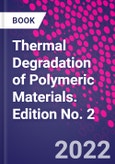Thermal Degradation of Polymeric Materials, Second Edition offers a wealth of information for polymer researchers and processors who require a thorough understanding of the implications of thermal degradation on materials and product performance. Sections cover thermal degradation mechanisms and kinetics, as well as various techniques, such as thermogravimetry in combination with mass spectroscopy and infrared spectrometry to investigate thermal decomposition routes. Other chapters focus on polymers and copolymers, including polyolefins, styrene polymers, polyvinyl chloride, polyamides, polyurethanes, polyesters, polyacrylates, natural polymers, inorganic polymers, high temperature-resistant and conducting polymers, blends, organic-inorganic hybrid materials, nanocomposites, and biocomposites.
Finally, other key considerations such as recycling of polymers by thermal degradation, thermal degradation during processing, and modelling, are discussed in detail.
Please Note: This is an On Demand product, delivery may take up to 11 working days after payment has been received.
Table of Contents
1. Introduction to Thermal Degradation of Polymeric Materials2. Mechanisms of Thermal Degradation of Polymers
3. Thermooxidative Degradation of Polymers
4. Thermal Degradation Techniques
5. Kinetics of Thermal Degradation
6. Thermal Degradation of Polymers, Copolymers and Blends
7. Thermal Degradation of Natural Polymers
8. Thermal Degradation of Inorganic Polymers
9. Thermal Degradation of High Temperature-Resistant Polymers
10. Thermal Degradation of Conducting Polymers
11. Thermal Degradation of Organic-Inorganic Hybrid Materials
12. Thermal Degradation of Polymer (Nano)composites
13. Thermal Degradation of Biocomposites
14. Recycling of Polymers by Thermal Degradation
15. Thermal Degradation During Processing of Polymers
16. Modelling of Thermal Degradation Process
17. Thermal Degradation of Polymeric Materials: Conclusions and Future Outlook








